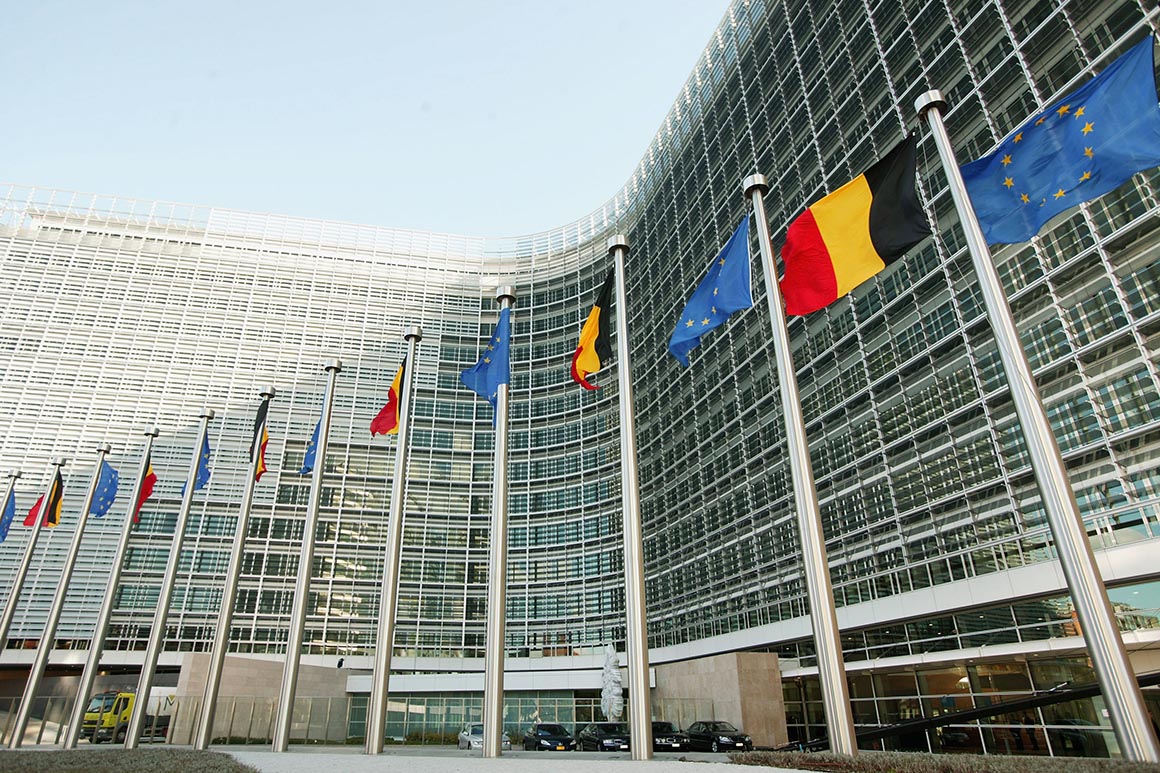
For now, the EU isn’t proposing any rules or laws to carry out the new vision, saying those specifics will come later. That left its advocates to insist that their policy outline “stems from European values and fundamental rights and the conviction that the human being is and should remain at the center.”
What the EU is leaving out
For one thing: China. For another: the United States.
The policy vision made no mention of how Europe will work with allies like the U.S. or Canada to ensure that their values prevail in the face of Beijing’s determination to achieve “military-civilian fusion” in the tech world.
The EU has struggled to develop a China strategy in general, so it’s no surprise that its digital blueprint lacks a strategy for handling Beijing. But Europeans are engaging in plenty of policy feuds with the U.S. on issues like digital taxes and the role of Huawei in 5G networks — making it somewhat surprising that the European Commission produced such an inward-looking policy rollout. The upshot: The bloc best known for its soft-power abilities to convene governments and other organizations in service of shared aims has no digital plans to do that.
In fact, the U.S. and China don’t come up at all in the Commission’s AI paper — the EU promises only to “continue to cooperate with like-minded countries, but also with global players” — and they barely get a reference in the data paper. That approach is likely to reinforce a tech policy disconnect between the U.S. and the EU, leaving the bloc further at the mercy of China’s innovations and investments.
Ideas for AI limits and new data rights
Some of the most eye-catching concepts in the new policy papers include requiring high-risk AI technology (for example in health and other major life decisions like hiring and housing) to undergo rigorous testing before it can be deployed or sold within the EU’s vast internal market, and requirements for health authorities (which routinely work with big companies) to pool their data in an EU “health data space” to allow more research to be conducted.
European internet users could also one day enjoy new data portability rights, such as the ability to take all their Facebook data like photos and friends lists and integrate it into another social network.
These ideas will all be subject to intense lobbying in coming months before any legal proposals are issued, but they will do little to fundamentally alter the world’s digital playing field.
One area for potential revolution was a marriage between the EU’s tech and climate goals (the continent is committed to going carbon neutral by 2050 at the latest). But the EU limited itself to requesting that data centers become carbon neutral by 2030, something many tech companies are already aiming for, and a future proposal to “ensure that devices are designed for durability, maintenance, dismantling, reuse and recycling and including a right to repair or upgrade to extend the lifecycle of electronic devices.”
The EU will also move to create a new public-private partnership on AI and robotics, but that comes from the same factory line that produced 5G, graphene and battery partnerships, which have so far failed to revolutionize their respective markets.
The EU’s powerful competition department will take a closer look at the data implications of mergers between large companies, adding to the antitrust fervor gaining strength among regulators and lawmakers on both sides of the Atlantic. But the bloc said little about creating new liabilities for digital platforms around the content published on their platforms — that’s the area of policy innovation that would have done the most to get big tech companies up in arms, and it would echo a major debate taking place in the U.S.
Meanwhile, European Commission President Ursula von der Leyen said she wants the troves of data being accumulated by billions of connected devices to “be available to all — whether public or private, big or small, startup or giant.” She contended that 85 percent of data produced today goes unused but didn’t say how she plans to get the world’s biggest tech companies to hand it over.
Why Europe’s ideas could matter
What’s different from the EU’s past digital strategies is that this time the Union’s top brass has been deployed, including tech dragon-slayer Margrethe Vestager and Thierry Breton, the former CEO of Atos, one of Europe’s biggest digital firms with 110,000 staff in 73 countries. In the past, digital issues were of second-tier importance in the EU system.
At least some in the U.S. tech industry see promise in the EU proposals — as well as some common ground with Washington.
“The policy objectives that we see in the papers that came out today and in U.S. strategy are really quite consistent,” said Aaron Cooper, the vice president of global policy for BSA | The Software Alliance, a trade group whose members include IBM, Microsoft, Oracle and Salesforce. He noted, for instance, that the U.S. government is also undertaking efforts to make federal data more available, while industry is weighing its own data-sharing models.
“I see a lot more opportunity here than I see downsides,” Cooper said.
Then there’s the GDPR precedent. Just as that law’s privacy regulations carried a global punch after years of gestating, so too could the standards that ultimately emerge from Wednesday’s principles, said Lisa Dyer, policy director for the Partnership on AI.
“It may not be something that we see immediately, but I think there was a lot to learn from GDPR that the EU is in a good position to move forward,” said Dyer, whose group’s members include Amazon, Google, Apple and Facebook. “I don’t think the tenor in the United States right now is to take a very heavy-handed approach in regulating AI, so I do plan to watch closely where the EU goes in this regard.”
On the other hand, Mozilla’s Daniel Leufer called the plans “disappointingly, if predictably, weak on facial recognition/ ai-powered biometrics. It acknowledges that the biometric processing involved is illegal and poses a threat to fundamental rights, yet only calls for ‘broad European debate.’”
What could go wrong?
While the strategy’s high-level support increases the level of strategic arm-twisting that can now take place in Brussels, it’s unlikely to eliminate the roadblocks that uncooperative European countries may erect.
Europe’s national governments have domestic squabbles or coalitions of their own to manage and tend to want to strictly limit the EU’s overall budget. They nearly always jealously guard against the EU moving into legal areas they are responsible for, which is a bad sign for ideas like a frictionless digital single market, pooled health data and serious action on taxes.
Europe also has a history of digital desperation. The continent has been in catch-up mode since the 1990s, when it struggled to adjust to the software and internet revolution after previously doing well in hardware and mobile, and saw its biggest tech companies (remember Nokia’s mobile dominance?) shrink in relevance.
The inescapable problem the EU now faces is that its digital lag is entrenched and its competitors are multiplying. To change that dynamic, it probably needs to change its digital fundamentals. The EU lacks a big defense budget and big venture capital pool, unlike the United States. It rules out subsidizing its companies the way China does. And it doesn’t have a plan to gang up with allies against strategic rivals.
The Trump administration — much loathed in Brussels — is also catching up on the one area where Europe remains in the lead: regulation and enforcement. The White House was first out of the gate with an AI strategy, which it offered in January while calling for Europe to follow Washington’s lead. The administration is also boosting funding for antitrust enforcement and changing the way it assesses tech mergers and markets.
Tech companies for their part have now largely priced-in Europe’s heavy fines as a cost of doing business. Their share prices continue to rise as markets recognize their superior abilities to minimize taxes and amass high-margin profits.
Europe is about to find out that it takes more than a couple of white papers to catch up in the fastest, biggest and most transformative revolution the world has seen.
Steven Overly contributed to this report.
Source: politico.com
See more here: news365.stream





